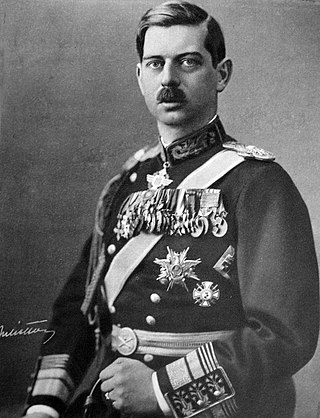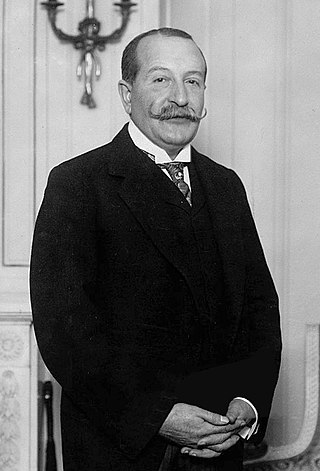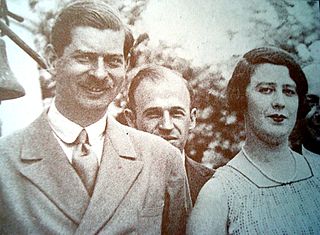Related Research Articles

A cabal is a group of people who are united in some close design, usually to promote their private views or interests in an ideology, a state, or another community, often by intrigue and usually without the knowledge of those who are outside their group. The use of this term usually carries negative connotations of political purpose, conspiracy and secrecy. It can also refer to a secret plot or a clique, or it may be used as a verb.

Carol II was King of Romania from 8 June 1930, until his forced abdication on 6 September 1940. As the eldest son of King Ferdinand I, he became crown prince upon the death of his grand-uncle, King Carol I, in 1914. He was the first of the Hohenzollern kings of Romania to be born in the country, as both of his predecessors had been born in Germany and came to Romania only as adults. As such, he was the first member of the Romanian branch of the Hohenzollerns who spoke Romanian as his first language and was also the first member of his royal family to be raised in the Orthodox faith.

Carol I or Charles I of Romania, was the monarch of Romania from 1866 to his death in 1914, ruling as Prince (Domnitor) from 1866 to 1881, and as King from 1881 to 1914. He was elected Prince of the Romanian United Principalities on 20 April 1866 after the overthrow of Alexandru Ioan Cuza by a palace coup d'état. In May 1877, Romania was proclaimed an independent and sovereign nation. The defeat of the Ottoman Empire (1878) in the Russo-Turkish War secured Romanian independence, and he was proclaimed King on 26 March [O.S. 14 March] 1881. He was the first ruler of the Hohenzollern-Sigmaringen dynasty, which ruled the country until the proclamation of a socialist republic in 1947.

The Kingdom of Romania was a constitutional monarchy that existed from 13 March (O.S.) / 25 March 1881 with the crowning of prince Karl of Hohenzollern-Sigmaringen as King Carol I, until 1947 with the abdication of King Michael I and the Romanian parliament's proclamation of the Romanian People's Republic.

Corneliu Zelea Codreanu, born Corneliu Zelinski and commonly known as Corneliu Codreanu, was a far right Romanian politician and the founder and charismatic leader of the Iron Guard or The Legion of the Archangel Michael, an ultranationalist and violently antisemitic organization active throughout most of the interwar period. Generally seen as the main variety of local fascism, and noted for its mystical and Romanian Orthodox-inspired revolutionary message, the Iron Guard gained prominence on the Romanian political stage, coming into conflict with the political establishment and the democratic forces, and often resorting to terrorism. The Legionnaires traditionally referred to Codreanu as Căpitanul, and he held absolute authority over the organization until his death.

Alexandru Averescu was a Romanian marshal, diplomat and populist politician. A Romanian Armed Forces Commander during World War I, he served as Prime Minister of three separate cabinets. He first rose to prominence during the peasants' revolt of 1907, which he helped repress with violence. Credited with engineering the defense of Moldavia in the 1916–1917 Campaign, he built on his popularity to found and lead the successful People's Party, which he brought to power in 1920–1921, with backing from King Ferdinand I and the National Liberal Party (PNL), and with the notable participation of Constantin Argetoianu and Take Ionescu.

Take or Tache Ionescu was a Romanian centrist politician, journalist, lawyer and diplomat, who also enjoyed reputation as a short story author. Starting his political career as a radical member of the National Liberal Party (PNL), he joined the Conservative Party in 1891, and became noted as a social conservative expressing support for several progressive and nationalist tenets. Ionescu is generally viewed as embodying the rise of middle-class politics inside the early 20th century Kingdom of Romania, and, throughout the period, promoted a project of Balkan alliances while calling for measures to incorporate the Romanian-inhabited Austro-Hungarian regions of Transylvania, Banat and Bukovina. Representing his own faction inside the Conservative Party, he clashed with the group's leadership in 1907–1908, and consequently created and led his own Conservative-Democratic Party.

Prince Barbu Alexandru Știrbey was 30th Prime Minister of the Kingdom of Romania in 1927.

Nicolae Malaxa was a Romanian engineer and industrialist.

Magda Lupescu, later officially known as Princess Carol of Hohenzollern-Sigmaringen, was the mistress and later wife of King Carol II of Romania.

The Romanian Communist Party was a communist party in Romania. The successor to the pro-Bolshevik wing of the Socialist Party of Romania, it gave an ideological endorsement to a communist revolution that would replace the social system of the Kingdom of Romania. After being outlawed in 1924, the PCR remained a minor and illegal grouping for much of the interwar period and submitted to direct Comintern control. During the 1920s and the 1930s, most of its activists were imprisoned or took refuge in the Soviet Union, which led to the creation of competing factions that sometimes came into open conflict. That did not prevent the party from participating in the political life of the country through various front organizations, most notably the Peasant Workers' Bloc. During the mid-1930s, due to the purges against the Iron Guard, the party was on the road to achieving power, but the dictatorship of king Carol II crushed this. In 1934–1936, PCR reformed itself in the mainland of Romania properly, with foreign observers predicting a possible communist takeover in Romania. The party emerged as a powerful actor on the Romanian political scene in August 1944, when it became involved in the royal coup that toppled the pro-Nazi government of Ion Antonescu. With support from Soviet occupational forces, the PCR pressured King Michael I into abdicating, and it established the Romanian People's Republic in December 1947.

Petre P. Carp was a Moldavian, later Romanian statesman, political scientist and culture critic, one of the major representatives of Romanian liberal conservatism, and twice the country's Prime Minister. His youth was intertwined with the activity of Junimea club, which he co-founded with critic Titu Maiorescu as a literary society, and then helped transform it into a political club. He left behind a budding career as Junimea's polemicist and cultural journalist, joining the state bureaucracy of the United Principalities, the Romanian diplomatic corps, and ultimately electoral politics. A speaker for aristocratic sentiment and the Romanian gentry, Carp helped create the Conservative Party from the various "White" conservative clubs (1880), but also led a Junimist dissident wing against the Conservative mainstream leaders Lascăr Catargiu and Gheorghe Grigore Cantacuzino. He was a contributor to the Junimea platform Convorbiri Literare, and founder of the newspapers Térra (1868) and Moldova (1915).

Constantin Argetoianu was a Romanian politician, one of the best-known personalities of interwar Greater Romania, who served as the Prime Minister between 28 September and 23 November 1939. His memoirs, Memorii. Pentru cei de mâine. Amintiri din vremea celor de ieri —a cross section of Romanian society, were made known for the sharp critique of several major figures in Romanian politics.

Grigore Iunian was a Romanian left-wing politician and lawyer. A member of the National Liberal Party (PNL) during the 1910s, he rallied with the Peasants' Party (PȚ) after World War I, and followed it into the National Peasants' Party (PNȚ), before leaving in 1933 to create the Radical Peasants' Party (PȚR), over which he presided until his death.

Max Carol Auschnitt, also known as Ausschnitt, Auschnit or Aușnit, was a Romanian businessman and political figure, one of his country's most prominent industrialists during the interwar period. Born to Ukrainian Jewish immigrants, he spent much of his youth abroad, returning in the 1910s to set up business as an importer of sheet iron, greatly expanding his father's fortune after World War I. Auschnitt was caretaker, and from 1929 managing director, of the Iron Domains and Factory (UDR) of Reșița, as well as founder of Titan-Nădrag-Călan (TNC), regional partner of Vickers-Armstrongs, and investor in many other fields. Primarily known as the "iron king" of Greater Romania, he had a business connection, and later a consuming rivalry, with manufacturer Nicolae Malaxa. The two were associate owners of Creditanstalt, which established their presence in Europe.

Ion Gigurtu was a far-right Romanian politician, Land Forces officer, engineer and industrialist who served a brief term as Prime Minister from 4 July to 4 September 1940, under the personal regime of King Carol II. A specialist in mining and veteran of both the Second Balkan War and World War I, he made a fortune in interwar Greater Romania. Gigurtu began his career in politics with the People's Party (PP) and the National Agrarian Party, moving closer to the far right during the 1930s, and serving as Minister of Industry and Commerce in the cabinet of Octavian Goga. Shortly after the start of World War II, Gigurtu was affiliated with King Carol's National Renaissance Front, serving as Public Works and Communications Minister and Foreign Minister under Premier Gheorghe Tătărescu, before the territorial losses incurred by Romania in front of the Soviet Union propelled him as Tătărescu's replacement.

Ernest Urdărianu (1897–1985), was the Minister of the Court during the reign of King Carol II of Romania (1930–1940). As closest confidant of the King Urdăreanu was, alongside Madame Lupescu, the King's mistress, the third member of the triumvirate which held virtually all power in the state during the 1930s. It is alleged that he was, after the King, the most powerful and the most hated man in Romania. Following the abdication of the King in 1940, Urdăreanu left the country together with him and Madame Lupescu to seek asylum and he stayed with them for the rest of his life.

Constantin Dumitru Beldie was a Romanian journalist, publicist, and civil servant, famous for his libertine lifestyle and his unapologetic, sarcastic, memoirs of life in the early 20th century. After modest but happy beginnings in life, Beldie played a small but essential part in the promotion of literary modernism, building bridges between the mainstream and the avant-garde. He became a pioneer of cultural journalism at Noua Revistă Română, before moving on to Ideea Europeană and ultimately Cuvântul, befriending philosopher-journalist Nae Ionescu. Like Ionescu, he promoted a vitalistic perspective on society and culture, veering into antiintellectualism after 1918.

Grigore N. Filipescu was a Romanian politician, journalist and engineer, the chief editor of Epoca daily between 1918 and 1938. He was the scion of an aristocratic conservative family, son of the statesman Nicolae Filipescu and a collateral descendant of Alexandru II Ghica. During the early stages of World War I, he and his father led a pro-Allied dissident wing of the Conservative Party. After serving on the front, and behind the lines to 1918, as aide to General Alexandru Averescu, Filipescu Jr. became his political adviser. He had a stint in the Labor Party, merged into Averescu's own People's Party. Filipescu served as the latter group's tactician and campaigner, but had irreconcilable differences with Averescu.

Aristide or Aristid Blank, also spelled Blanc or Blanck, was a Romanian financier, economist, arts patron and playwright. His father, Mauriciu Blank, an assimilated and naturalized Romanian Jew, was manager of the Marmorosch Blank Bank (BMB), a major financial enterprise. Aristide took up jobs within the same company, and introduced various new ideas for development with a series of pamphlets. He was drafted as a junior officer in the Second Balkan War and again in World War I, though he did not see action during the latter; instead, he advanced causes related to Romanian nationalism, as well as his own agenda, in the Russian Republic, in the Far East, and eventually in France. He also began expanding BMB investments, branching out into maritime transport and founding CFRNA/CIDNA airlines. This period witnessed his attempt at setting up a press empire around the twin dailies Adevărul and Dimineața, and his brief engagement with Epoca.
References
- 1 2 3 4 Gunther, John (1940). Inside Europe. New York: Harper & Brothers. pp. 33–34.
- 1 2 3 4 5 6 R. G. Waldeck, Athene Palace, New York: Robert M. McBride and Company, 1942.
- 1 2 3 4 5 Hans-Christian Maner, Parlamentarismus in Rumänien (1930-1940): Demokratie im autoritären Umfeld, Munich: Oldenbourg Wissenschaftsverlag, 1997, ISBN 3-486-56329-7, ISBN 978-3-486-56329-0.
- ↑ (in Romanian) Zigu Ornea, "Dezvăluirile lui Constantin Beldie" Archived 2014-03-10 at the Wayback Machine , România literară, 46/2000
- ↑ Petre Pandrea, Cronică valahă cu inginerul Malaxa ("Wallachian Chronicle with Engineer Malaxa"), in Magazin Istoric, May 2002.
- ↑ "Prince Dolgoroukov on Russia and Self-Emancipation." Edinburgh Review, July, 1860. p. 90
- ↑ Machray, Robert. "The Political Situation in Russia." The Nineteenth Century and After, volume 81, March 1917. pp. 601-602
- 1 2 3 Preston, Paul (1994). Franco: A Biography. New York, New York: BasicBooks. p. 734. ISBN 0-465-02515-3.
- 1 2 3 4 5 6 7 Payne, Stanley G. (2014). Franco: A Personal and Political Biography. Madison, Wisconsin: Wisconsin University Press. p. 470. ISBN 978-0-299-30213-9.
- ↑ Somalo, Javier (26 October 2019). "Franco y el paréntesis de la Democracia" [Franco and the Parenthesis of Democracy]. Libertad Digital (in Spanish). Retrieved 24 July 2020.
This article needs additional citations for verification .(April 2007) |